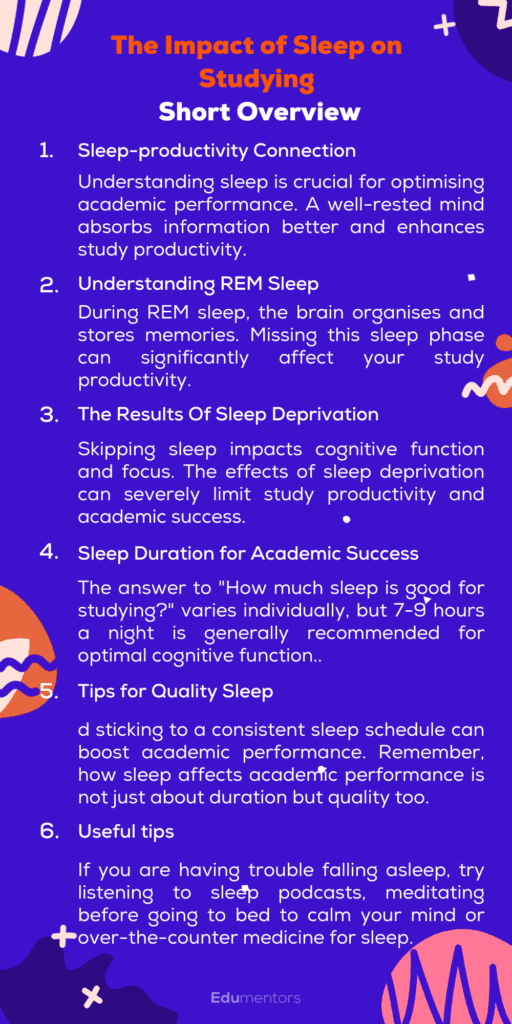The Impact of Sleep on Learning
Sleep is a fundamental human need, yet it’s often compromised in the pursuit of productivity and academic achievement. But have you ever stopped to consider the question, “How does sleep affect productivity and academic performance?”
Whether you’re a student managing multiple commitments like the GCSE’s, A-levels and 11+ exams or a professional working to meet goals, productivity is usually high on the agenda. However, the critical role that sleep plays in enhancing or impairing productivity is frequently underestimated, particularly in educational settings.
This article will explore the nuanced relationship between sleep and productivity, focusing on its specific relevance to academic performance. Using evidence-based insights and practical examples, we’ll discuss why sleep should be an essential consideration in your approach to productivity and academic success. So before you contemplate another sleep-deprived night, read on to learn how prioritising sleep could be your hidden advantage.

The Science Behind Sleep
Before diving into the mechanics of how sleep impacts productivity, particularly in an academic setting, it’s crucial to understand the fundamental science behind sleep itself.
Sleep Cycle and REM Sleep
Human sleep is structured in cycles, typically lasting about 90 minutes each, and consisting of different stages. One of the most crucial is Rapid Eye Movement (REM) sleep. This stage of sleep is particularly important for memory consolidation—a key factor when it comes to studying and learning. During REM sleep, your brain sorts and stores information, making connections that help you better understand complex subjects and improve problem-solving abilities. Skipping this essential phase could lead to less effective learning, thus undermining study productivity.
The Effects of Sleep Deprivation
What happens when we don’t get enough sleep? The consequences are far from trivial. Sleep deprivation can severely impact cognitive function, leading to diminished attention span, reduced problem-solving capabilities, and impaired judgement. The effects of sleep deprivation extend beyond mere tiredness; they can result in notable decreases in study productivity and even contribute to academic underperformance.
In summary, lack of adequate sleep doesn’t just make you feel tired; it directly affects your ability to process information and focus on tasks—two vital components for academic success.

The Effects of Sleep on Study Productivity
In short, sleep is not just a passive state of rest; it’s an active state of reorganisation and restoration that significantly influences your ability to study efficiently and effectively. When combined with powerful study techniques like active recall, proper sleep can dramatically enhance your learning outcomes. Ignoring these vital components in your educational toolkit could mean missing out on maximising your study productivity.
Research Findings
A wealth of studies has shown a direct correlation between sufficient sleep and academic productivity. For example, a study published in the “Journal of Sleep Research” found that students who adhered to a consistent sleep schedule exhibited improved academic performance compared to those with irregular sleep patterns. Another seminal study in “Nature Neuroscience” demonstrated that REM sleep positively affected memory recall and problem-solving abilities—critical skills for academic success.
Real-world Implications
The impact of sleep on study productivity isn’t merely theoretical; it manifests in practical, observable ways. For instance, students who get a full night’s sleep before exams often outperform those who pull all-nighters, not only in terms of grades but also in skills like critical thinking and information retention. Moreover, educational institutions like universities and colleges are recognising the importance of sleep by implementing ‘nap pods’ and offering sleep education seminars to help students understand how sleep improves productivity.
In short, sleep is not just a passive state of rest; it’s an active state of reorganisation and restoration that significantly influences your ability to study efficiently and effectively. Ignoring this vital component in your educational toolkit could mean missing out on maximising your study productivity.
How Much Sleep is Good for Studying?
Determining the ideal amount of sleep can be a bit like hitting a moving target; individual needs can vary. However, there are general guidelines that can serve as a useful starting point for those looking to optimise their study productivity.
General Recommendations
The National Sleep Foundation recommends that teenagers get between 8 to 10 hours of sleep per night, while adults should aim for 7 to 9 hours. These guidelines apply generally but are particularly relevant when studying is involved, as a well-rested mind is more capable of absorbing and retaining information.
Tailoring to Individual Needs
It’s important to note that ‘one size does not fit all’ when it comes to sleep. Some people may find that they operate best with as little as 6 hours, while others might require a full 9 hours for optimal cognitive functioning. Paying attention to how you feel and perform after different amounts of sleep can help you determine your individual needs.
Sleep Quality Over Quantity
While the focus is often on the number of sleep hours, the quality of sleep is equally important. Factors like sleep consistency, the sleep environment, and avoiding sleep disruptors like caffeine and electronics, can all contribute to a more restful and productive sleep.
So, how much sleep is good for studying? The answer will vary from person to person, but adhering to general guidelines and tailoring them to your specific needs can serve as an effective strategy for optimising study productivity.
Tips for Improving Sleep
Understanding how sleep affects academic performance is essential, but implementing strategies to improve sleep quality is equally important. One of the first steps to a restful night is creating a sleep-friendly environment. This means keeping your bedroom dark, cool, and quiet to facilitate better sleep. Don’t underestimate the importance of a comfortable mattress and pillows that support a good sleeping posture; these can make a world of difference.
Consistency is key when it comes to sleep, so try to go to bed and wake up at the same time every day, even on weekends. A regular pre-sleep routine can also signal to your body that it’s time to wind down; consider activities like reading or taking a warm bath. Food and drink choices can also impact sleep quality. For instance, it’s advisable to avoid caffeine and alcohol close to bedtime as they can disrupt your sleep cycle. If you find yourself hungry before bed, opt for a light, non-sugary snack to prevent waking up due to hunger during the night.
Technology can be a sleep deterrent, so limit your screen time before bed. The blue light emitted by phones, tablets, and computers can interfere with melatonin production, the hormone responsible for sleep. Try to disconnect at least an hour before you plan to sleep. Exercise is beneficial for sleep and academic performance, but it’s best to avoid vigorous workouts close to bedtime. A moderate exercise routine earlier in the day can promote better sleep and improve focus during study sessions.
Lastly, consider reviewing your day and planning for tomorrow as a pre-sleep activity. This can help to ease your mind and prevent stress-induced sleeplessness, giving you a clearer focus for the next day’s tasks. By adhering to these practical tips, you’re well on your way to improving both your sleep quality and your academic performance.

Conclusion
As we’ve explored throughout this article, the relationship between sleep and productivity, particularly in an academic context, cannot be overstated. From the mechanics of the sleep cycle and the crucial role of REM sleep in memory consolidation to the debilitating effects of sleep deprivation on study productivity, the science is clear: sleep matters.
Research demonstrates that not only does sleep improve productivity, but it also significantly affects academic performance. And it’s not just about the amount of sleep you get; the quality of your sleep is equally important. We’ve also provided some practical guidelines to help you answer the question of “How much sleep is good for studying?” and offered actionable tips to improve your sleep and, by extension, your academic productivity and mental well-being.
In a world where time is often seen as a limited resource, it’s tempting to cut corners on sleep to get more done. However, this strategy is counterproductive in the long run. Sleep is not merely a passive state but an active process that has a direct and profound impact on your ability to study effectively and be productive. Finding efficient study methods, such as participating in well-structured online study groups, can help you make better use of your time and avoid sacrificing sleep.
So, before you consider skimping on those valuable hours of rest, remember that sleep is a critical tool in your productivity and study regime. Make it a priority and reap the rewards in your academic journey.








